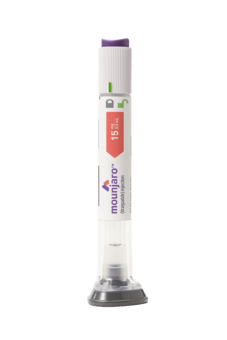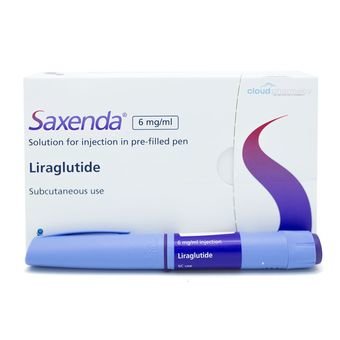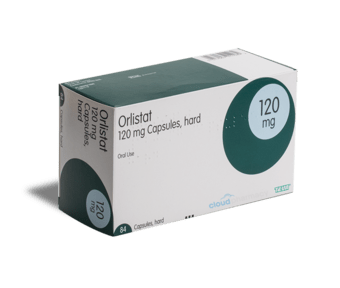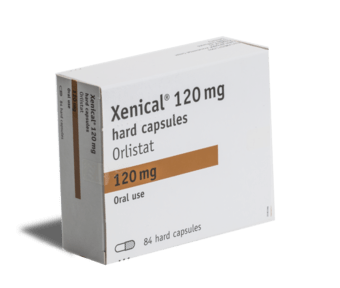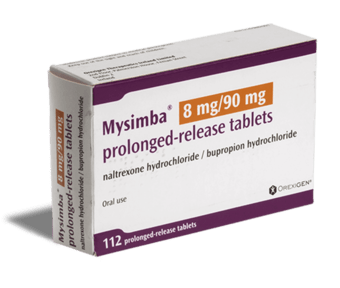Medication features
Mounjaro is a clinically proven weight loss aid prescribed to help with weight loss when other efforts have been ineffective. It works by acting on hormones responsible for blood sugar and appetite control. This reduces hunger and helps improve blood sugar levels. The once-weekly self-administering pen is user-friendly.
This is supplied with enough needles for treatment.
- Once Weekly Injection
- Clinically Proven
- Comes with enough needles
- Same family as Wegovy
- Feel fuller for longer
- Free online consultation
Mounjaro Weight Loss Injection Summary
| About Mounjaro | Mounjaro is a prescription self-administering injection for weight loss. This medication is used in conjunction with diet and exercise to improve glucose (blood sugar) levels in adults who are overweight and in those who have type 2 diabetes. |
|---|---|
| Medicine Type | GIP and GLP-1 analogue |
| Mechanism of Action | It helps regulate blood sugar levels and reduces hunger replacing it with a feeling of fullness |
| Active Ingredient | Tirzepatide |
| Effective Within | Up to 20% weight loss at 40 weeks |
| Pack Size | 1 pen which lasts for a month (4 weekly injections) |
| Strength | 2.5mg, 5mg, 7.5mg, 10mg, 12.5mg and 15mg |
| Take whilst pregnant? | No |
| Take whilst breastfeeding? | No |
| Suitable Age | 18+ |
| Consultation Required? | Yes - you can do this here |
Overview
What is Mounjaro and How Does it Work?
Mounjaro is a treatment for weight loss. It is available as a prefilled pen that you inject yourself once a week. Mounjaro is the UK-licensed version of Zepbound, which is licensed in the US.
The active ingredient in Mounjaro is Tirzepatide. Trizepatide attaches to receptors of hormones called GIP and GLP-1. GLP-1 and GIP are produced naturally in the body when you eat something.
Once tirzepatide is attached to the receptors, it mimics the same way GIP and GLP-1 work and tells the body to increase the amount of insulin from the pancreas. This helps the body regulate (control) blood sugar levels and reduce the amount of food you eat. It also helps:
- The body releases insulin (hormone) when blood sugar levels are high
- Stop the liver from making and releasing too much sugar
- The body removes excess sugar (glucose) from the blood
- Reduce how much food you eat
- Slow down how fast food leaves the stomach
How Effective is Mounjaro?
When using Mounjaro kwikpens to suppress appetite, you can expect to lose around 15-20% of your initial body weight after completing treatment with a balanced diet and exercise. This is the most effective of all the released GLP-1 medications so far including Wegovy.
These figures have been achieved by patients who have maintained on the highest strength of Mounjaro, which is the 15mg strength.
In a trial carried out by Eli Lilly, it was shown that patients who maintained dose at 10mg lost an average of 17% of their body weight whilst patients who maintained dose at 5mg, lost around 15%.
Where Can You Buy Mounjaro in the UK?
You can only buy Mounjaro in the UK with a prescription from a doctor at a registered pharmacy.
Alternatively, you can purchase Mounjaro online from Cloud Pharmacy after completing a quick health consultation. Once you have been approved for treatment after a free consultation with a registered pharmacist, your medicine will be securely and discretely delivered to your UK address as soon as the next working day.
Mounjaro Weight Loss Alternatives
During your online consultation with a Cloud Pharmacy pharmacist, the following alternatives to Mounjaro may be suggested:
Weight Loss Injections
- Saxenda: Saxenda is an injectable weight loss aid that contains the active ingredient Liraglutide, which is a GLP-1 receptor agonist.
- Wegovy: Wegovy is a once-weekly injectable weight loss aid that has the active ingredient Semaglutide. It is an appetite suppressant (GLP-1 receptor agonist).
Weight Loss Pills & Capsules
- Orlistat 120mg: Orlistat tablets are effective weight-loss tablets used to treat obesity. They are the generic version of Xencal and work by reducing the amount of fat the body absorbs.
- Mysimba: This medication is a combination of Naltrexone and Bupropion and is used to treat obesity.
- Xenical 120mg: The brand name version of Orlistat. These tablets contain the active ingredient orlistat and break down dietary fats into smaller pieces before your body absorbs them.
The Science Behind Mounjaro
Mounjaro has been approved for use by the FDA (American regulatory authority) and the UK MHRA and has been proven to be safe and effective for treating weight loss in obese patients and patients with type 2 diabetes.
Data has shown that patients can experience weight loss in as little as 4 weeks. Further weight loss can be observed until the study ends at 40 weeks. Patients at an optimal dose experienced a total weight loss of ~ 20% of their starting weight after 40 weeks.
Informational Sources
If you’d like to find out more about Mounjaro or weight loss medication in general, we’ve compiled a list of additional resources below for you to take a look at:
Mounjaro Reviews
Mounjaro has very positive reviews for those using it for weight loss (obesity/overweight treatment). Reviewers commented that in conjunction with regular exercise and improved eating habits, they were able to lose a large amount of weight and come off medications that they were prescribed for conditions caused by their weight.
Reviewers mentioned that they experienced minimal to no side effects when taking Mounjaro.
Directions of Use
Mounjaro Weight Loss Pen Dosage & Directions of Use
How to Use a Mounjaro KwikPen
Mounjaro comes in a pre-filled pen that is designed to deliver the medication under your skin (subcutaneously). The pen comes with a complete guide on how to use it. It is important to read and understand it before using the pen. To take your weekly dose of Mounjaro, follow these steps:
- Remove the KwikPen from the packaging, and check the expiration date
- Next, make sure that the site of the skin on your stomach, upper arm, or thigh is clean and dry
- Remove the cap from the pen and wipe the injection site with an alcohol swab
- Choose a new needle. This helps prevent infections and any blocked needles
- Push the capped needle straight into the pen and twist it until it is tight
- Pull off the outer needle shield (cap) and keep it. You will reuse it later
- Hold the pen with firm pressure against the skin at a 90-degree angle. Then press the button to retract the needle
- Once the needle is inserted into your skin, hold the pen still for 5 seconds, then release the button to retract (remove) the needle
- Throw away the used pen, and put the needle in a sharps container or follow your doctor's instructions for safe disposal
Mounjaro needs to be taken weekly. It is important to take it at the same time every week. Avoid injecting the medication into the same spot (site) every time to prevent skin irritation.
Mounjaro Dosages
Multiple doses of Mounjaro are available, as treatment typically begins at a low dose and slowly increases over a few months. This process is called dose titration. How your doses increase depends on how your weight loss journey is progressing and how well you are tolerating the treatment.
The starting dose for all new patients is 2.5mg of Mounjaro. Patient dosages typically follow:
| Month | Dosage (per week) |
| 1 | 2.5mg (starting dose) |
| 2 | 5mg (maintenance dose) |
| 3 | 7.5mg |
| 4 | 10mg (maintenance dose) |
| 5 | 12.5mg |
| 6 | 15mg (maintenance dose) |
It is important to remember that everyone's weight loss journey is different. Talk to your doctor or pharmacist about any side effects you experience, how well you are tolerating the dosage strength and any concerns about your weight loss that you may have.
Ingredients
Mounjaro Ingredients
The active ingredient:
- Tirzepatide
Inactive ingredients in each injection are:
- Sodium phosphate dibasic heptahydrate, water for injections, Benzyl alcohol, phenol, glycerol, sodium chloride, concentrated hydrochloric acid, and sodium hydroxide (for pH adjustment)
Side Effects
Mounjaro Side Effects
Like all medicines, Mounjaro can cause side effects, although not everyone will get them.
Common Side Effects of Mounjaro Weight Loss Pen
Common side effects of Mounjaro may affect up to 1 in 10 people. They include:
- Low blood sugar
- Flatulence (gas)
- Allergic reaction
- Dizziness
- Decreased appetite (feeling less hungry)
- Feeling tired
- Fast pulse (common in diabetes type 2 patients and not weight loss patients)
- Increases levels of pancreatic enzymes (uncommon in weight loss patients)
- Burping
- Indigestion
- Stomach pain
- Reflux or heartburn
- Hair loss in patients being treated for weight loss
Talk to your doctor or pharmacist about persistent, common side effects. Depending on where you are in your weight loss journey, your dose strength may need to be decreased.
Less Common Side Effects of Mounjaro Weight Loss Pen
Uncommon side effects may affect up to 1 in 100 people, they include:
- Increased Calcitonin levels in the blood
- Gallstones
- Low blood sugar levels
- Injection site pain
- Cholecystitis (infection of the gallbladder)
- Kidney problems and kidney failure
- Depression
Seek immediate medical attention if you experience nausea and vomiting, severe pain in the upper part of the abdomen that can radiate to the back, and fever and a fast heartbeat. These symptoms can be a sign of pancreatitis, which is a life-threatening condition.
Speak to your doctor or pharmacist if you notice uncommon side effects. To see a full list of all possible symptoms, refer to the Mounjaro Patient Information Leaflet.
Warnings
Mounjaro Warnings
Before using Mounjaro, talk to your doctor and pharmacist:
- If you have ever had pancreatitis
- If you have any problems with your eyes (macular oedema or diabetic retinopathy)
- If you have serious problems with food digestion or with food staying in your stomach longer than normal (including severe gastroparesis)
- If you are using a sulphonylurea or insulin for diabetes
When starting Mounjaro for the first time, ensure that you stay hydrated by drinking plenty of fluids. Talk to your doctor or pharmacist about any other questions or concerns you have.
Mounjaro and Oral Contraceptives
If you are a women taking oral contraceptives, and you are overweight or have obesity, it is recommended to consider switching to a non-oral contraceptive method or using a barrier method (e.g., condom) for 4 weeks after you start using Mounjaro, and for 4 weeks after each time the dose is increased.
Patient Information Leaflet
Mounjaro Weight Loss Injection Patient Information Leaflet
For more information about Mounjaro, please take a look at the information leaflet below. It is important you read the Patient Information Leaflet (PIL) before using Mounjaro.
Mounjaro Weight Loss Injection FAQs
Can a Doctor Prescribe Mounjaro for Weight Loss?
Yes, a doctor can prescribe Mounjaro for overweight or obese patients looking for help to use weight. Remember, Mounjaro is not a magic injection, it is an aid to be used in conjunction with exercise and improved nutrition.
Can I Take Mounjaro if I Don't Have Diabetes?
Yes, you can take Mounjaro if you don’t have diabetes. Mounjaro has been approved for use in people who have type 2 diabetes and in patients who are overweight or obese and need help to lose weight.
Which is Better, Ozempic or Mounjaro?
Mounjaro is more effective than Ozempic for weight loss and blood sugar control. However, Mounjaro is more expensive than Ozempic, and it has more reported side effects.
Can I Drink Alcohol While Using Mounjaro?
While there are no known interactions between Mounjaro and alcohol, alcohol consumption can affect your blood sugar levels. Some types of alcohol are also a significant source of calories. Talk to your doctor or pharmacist before drinking alcohol while using Mounjaro.
Is Mounjaro Available in Generic Form?
No, currently there is no generic version of Mounjaro available.
Is Mounjaro Addictive?
No. The active ingredient is Tirzepatide, which helps regulate blood sugar levels and appetite. Tirzepatide is not known to be addictive or cause dependence.
Mounjaro Vs Saxenda
Saxenda (liraglutide) injection 3 mg is an injectable prescription medicine that may help some adults with excess weight (BMI ≥27) who also have weight-related medical problems or obesity (BMI ≥30) lose weight and keep the weight off. Saxenda should be used with a reduced-calorie meal plan and increased physical activity.
Both Mounjaro and Saxenda are GLP-1 receptor agonists, and are part of the same family of injectable hormone like drugs, however the main difference between the two is that Saxenda is administered once DAILY, whereas Mounjaro is administered once WEEKLY.
Related Guides
Delve into a variety of content written by our medical experts
Mounjaro Weight Loss Injection Reviews
Confirm Mounjaro Weight Loss Injection treatment selection
| Starting Dose 2.5mg | 1 Month | £138.99 |
| Starter Pack 2.5mg & 5mg | 2 Month Starter Pack | £289.00 |
| Starter Pack 2.5mg & 5mg & 7.5mg | 3 Month Starter Pack | £449.99 |
| 5mg | 1 Month | £138.99 |
| 7.5mg | 1 Month | £164.99 |
| 10mg | 1 Month | £168.99 |
| 12.5mg | 1 Month | £194.99 |
| 15mg | 1 Month | £198.99 |
